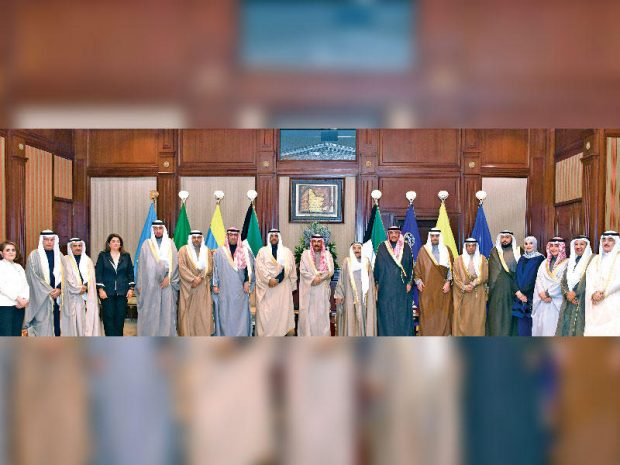Kuwait’s cabinet includes three women for the first time

Kuwait’s new-look cabinet (Al Jarida)
Kuwait: Kuwait’s new-look cabinet includes a new prime minister and seven new ministers, half of the total number.
None of the ministers in the 36th cabinet to be formed over 57 years since the country’s independence has open affiliations to religious societies in a clear departure from traditions that have marked successive governments.
Three ministers are from Al Sabah family who have been the rulers of the country, but for the first time, the interior minister is not from the family.
The new line-up includes and for the first time in the northern Arabian Gulf country three women: Mariam Oqeil Al Oqeil as finance minister and acting state minister for economic affairs, Rana Abdullah Al Fares as minister of public affairs and state minister for housing affairs, and Ghadeer Mohammad Mahmoud as minister of social affairs.
Although women in Kuwait have been socially, politically and economically empowered for years, not many women have been given ministerial portfolios.
The appointment of three women ministers was a highly welcome breakthrough in the modern country with impressive achievements, but where deep-rooted traditions still prevail in some areas.
The success of Kuwaiti women is the culmination of a long struggle that spanned more than four decades.
In 1971, and in a bold move, women’s rights activist Nooria Al Sadani, head of the Arab Women’s Day Committee, submitted a women’s political rights memorandum to the parliament. Lawmakers debated the issue during three sessions, but rejected it.
One year later, on December 11, MP Salem Al Marzooq presented a proposal to give educated Kuwaiti women the right to vote. Only 12 lawmakers supported his call.
The two failures somewhat dampened enthusiasm, but in February 1975, two lawmakers — Jasem Abdul Aziz Al Qatami and Rashid Al Farhan — presented a draft law to empower women politically. No action was taken and the situation remained stagnant until 1981 when Lawmaker Ahmad Al Fahd Al Takhim submitted a new bill that would give women the right to vote and run in elections.
Other bills to empower women politically followed, submitted by lawmaker Abdul Rahman Al Ghunaim in 1986, by lawmaker Hamad Al Jawaan in 1992; by MPs Ali Al Baghli, Abdul Mohsin Jamal, Abdullah Al Nibari and Jassem Saqr in 1994, and by MPs Salah Khorsheed and Abbas Al Khadhari in 1996.
In 1999, then Emir Shaikh Jaber Al Ahmad Al Sabah expressed full support for women’s political rights, including voting and running in parliamentary elections starting in 2003. The government drafted a law for the political empowerment of women. However, the parliament rejected the draft by a two-vote majority.
Activists refused to give in and persisted in their drive to secure the political empowerment of Kuwaiti women.
In 2002, the Constitutional Court threw out a case filed by two Kuwaiti women against the interior ministry for not allowing them to register their names in the electorate.
However, in May 2003, the government approved amendments to the municipal law allowing women to vote and run in municipal elections and to be appointed to municipal councils.
One year later, the government presented a bill to the parliament to amend the elections laws to allow women to run and vote.
The much-anticipated breakthrough occurred in May 2005 when 35 lawmakers voted to give women their full political rights, including running and voting in parliamentary elections. The motion was passed since only 23 lawmakers opposed it.
Women in Kuwait made history in June 2006 when Jinan Bushehri and Khalida Al Khedher became the first Kuwaiti women to contest in a municipal election.
In May 2008, it was the turn for 27 women from the five constituencies to make history by running in the parliamentary elections. None of them won, although Aseel Al Awadhi, Rola Dashti, Fatima Al Abdali and Dhikra Al Rasheedi obtained high scores.
However, exactly one year later, four women won in the parliamentary elections for the first time in Kuwait’s history. Maasooma Al Mubarak (the first woman minister in Kuwait), Salwa Al Jassar, Aseel Al Awadhi and Rola Dashti were hailed as the trailblazing architects.
In the current parliament, there is only one female lawmaker.
























































